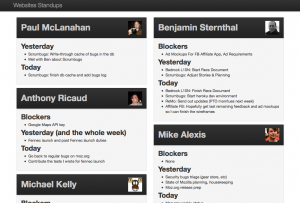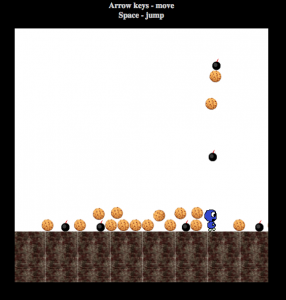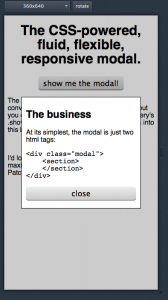Each month Mozilla Webdev gets together and holds a series of lightning talks on side-projects and other interesting matters, and this month was no different. The June 2012 Beer and Tell has come and gone, and it’s time to recap what went down!
Read on to see what was presented, or scroll down to the end of the post to see the recording for yourself.
Websites Standup App
Yours truly showed off the Websites Standup App, which shows the latest daily updates from each member of the Websites team. Team members log their daily update via Yammer, and the Standup app uses the Yammer JavaScript API to pull in those posts and display them in a nice format (and, more importantly, only displays the latest update from each member). I specifically highlighted that getting the Yammer JavaScript API up and running was particularly easy.
Check out the source code to see an example of how to use the Yammer JavaScript API!
slay.js: yet another game engine
jlongster created a JavaScript game engine called slay.js. It aims to be a simple framework for hooking together behavior and objects to create a game. The engine comes with two demo games that show off the basics of the engine, one of which involves delicious cookies! Future plans include a live in-game editor that will let players pause the game and edit code directly.
You can see both demos on jlongster’s Github pages, but be warned that the initial load time may freeze your browser for a bit — be patient!
Fancy Modals!
potch showed off a CSS-powered modal that fits to the user’s screen and the modal’s contents without any JavaScript to calculate the sizing. Because of the automatic sizing, the modal is responsive, looking great at mobile and desktop resolutions. As an added bonus, the markup for the modal is short and sweet, consisting of two tags. You should check out the source code!
Playdoh switches to django_compressor
peterbe talked about how playdoh has switched from using jingo-minify to django_compressor. There are several benefits to this switch, including putting static assets back into the HTML instead of maintaining lists in a settings file, as well as support for using the staticfiles module in Django. Documentation has been provided to help playdoh-based websites make the switch.
The Video
If you’d rather watch it for yourself, here you go:
We hope you enjoyed this month’s Beer and Tell and will join us again in July! If you have any questions, remarks, or concerns, don’t hesitate to comment on this post!


